Kids Aren’t the Only Ones AD/HD Affects
Coaches in Action
by Maryanne Kocis MacLeod: Macomb Daily
March 4, 2003
"While it is widely known that 3 percent to 7 percent of school-age children struggle with ADHD, about 3 percent to 4 percent of adults also live with the disorder."
One of Julie Molner's clients, a college student, concentrates best while jogging. To capitalize on this strength, the student tapes class lectures and listens to them on his headphones while doing laps around campus.
Movement is also key for a second client, who receives one-on-one encouragement from Molner via cell phone while walking briskly around her neighborhood.
Both clients have adult Attention Deficit Hyperactivity Disorder.
Molner, who was trained and certified as a Life Coach two years ago, specialized in ADHD when she and her husband were both diagnosed. ADHD is a neurological brain disorder that manifests as a persistent pattern of inattention or hyperactivity. A professional life coach provides clients with feedback, insights and guidance in meeting his or her personal life goals.
"I try to shift focus to the positives -- strengths and talents stemming from the disorder," Molner said. Once they begin to appreciate these abilities, Molner shows them how to harness them for success.
Common strengths include creativity, charisma, the ability to hyper focus, high energy, drive and enthusiasm.
While it is widely known that 3 percent to 7 percent of school-age children struggle with ADHD, about 3 percent to 4 percent of adults also live with the disorder, according to www.webmd.com
"I give them tips and strategies they can build on," Molner said. "Some take meds, some don't, but medicine alone isn't going to help someone with ADHD thrive. They need to learn how to manage their condition."
It also helps to know that the seemingly endless challenges of ADHD are not the result of personal inadequacy.
ADHD affects a person's ability to maintain attention and control behavior and impulses. In children, ADHD typically manifests as hyperactivity-impulsivity while adults with the disorder tend toward inattention.
Symptoms include restlessness, excessive talking, frequent interruption of others, failure to pay attention to details, avoidance of tasks that require concentration, loss or misplacement of things, inability to concentrate and being easily distracted.
Relationship problems, unfortunately, are another common denominator, said Sterling Heights psychologist Melhim W. Restum, founder of the ADDapt method for managing ADHD.
"Significant others don't understand why they do what they do," said Restum, who will be leading a series of ADDapt seminars March 11-13 at his office.
Ironically, one of the most common points of friction is the ability to hyper focus in one area -- for example, watching football or doing work -- while neglecting other responsibilities, such as taking an active interest in the loved one.
"The person might interrupt a lot, or fail to nod their head when the other person is speaking," Restum said. "The loved one then feels like 'You're not invested in me as a person.' "
Sometimes these behaviors manifest in the workplace, with the same ill effect on colleagues, superiors and subordinates.
"These are often bright, creative people, with a lot of good ideas -- but they're very socially alert," Restum continued. "In fact, they notice too much -- they have difficulty determining what's important at the moment."
While diagnosis is a complex process, those who exhibit these symptoms should talk to their doctor.
The good news is adults with ADHD can take control of their relationships, careers and lives with self-awareness and coping skills. For example, Molner and Restum both recommend taking notes or doodling while talking on the phone or listening to a presentation to free the mind to focus on what's being said. For those with sedentary jobs, Restum recommends taking frequent breaks and/or running office errands to break monotony and reignite enthusiasm.
Molner encourages adults with ADHD to seek out careers and activities that truly interest them -- this is where hyperfocusing can be a good thing. Recognize, however, that hyper focusing can also lead to being late for meetings and other important events. Set a timer if you have to, or have a colleague or family member gently remind you of your obligations.
"Know your triggers," Molner said. "Then plan how you will pull yourself out."












